Quick Summary: Learn all the essential aspects of MVP (Minimum Viable Product) development, including its definition, significance, and challenges. You will also learn what an MVP development company is, its role, the benefits of collaborating with these companies, what to look for, the MVP development process, cost, and additional valuable insights.
In the competitive landscape where an astounding 4.7 billion new businesses are launched yearly, it’s like throwing a dart blindfolded because not every venture succeeds. In fact, statistics reveal that, flabbergastingly, 90% of these startups fail for one reason or another.
If you're considering spending big bucks on comprehensive application development for your business without knowing if the idea will float or sink, the likelihood of that app never reaching users' devices is higher than you might think. But don’t sweat just yet. You can always start with MVP (Minimum Viable Product) development, which will be your safety net from the downfall. Curious to know what MVP is and how it can benefit your business? Let’s find out.
Choosing an MVP Development Company
Here’s what you’ll gain:
-
What is an MVP?
-
How can an MVP save your business?
-
What challenges must you overcome in MVP development?
-
What is an MVP development company, and how can it help your business grow?
-
What are the benefits of partnering with an MVP development company?
-
What should you look for when choosing the right MVP development partner?
-
What’s involved in the MVP development process?
-
What is the cost of developing an MVP?
What is MVP?
MVP (Minimal Viable Product) is like a rough draft of your idea, which is a basic version of the software solution that can be released on the market. It will enable you to collect feedback from the customer and understand their requirements, without going all-in development. It's like dipping your toe in the water before jumping into the pool—to check if the temperature is right.
With MVP you can test the waters, figure out what’s gonna work, and refine the idea accordingly before sinking tons of money and time into a big, shiny project right away. In short, it gives you a better shot at hitting the bullseye.
Why MVP Development is Crucial for Startups?
Startups are all about agility, speed, and of course - budget. Throwing every resource at an unvalidated idea is like running after a rainbow hoping to find a pot of gold—you’re fueled by excitement, but it might just lead you in circles. Some of the reasons why developing an MVP is essential for your startup are:
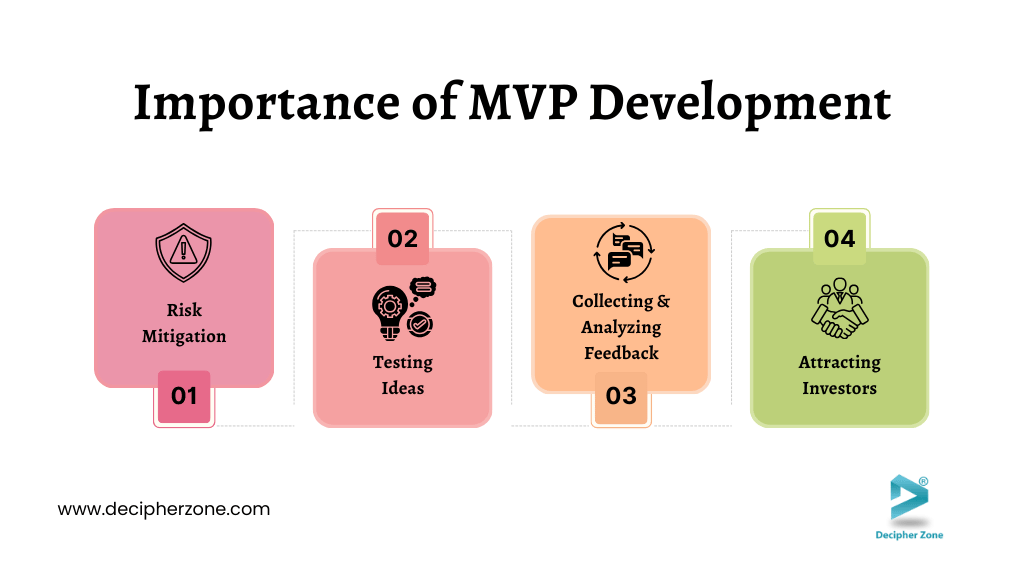
1. Risk Mitigation
Let’s be honest - no one wants to risk their fortune building something that might not even be liked by the users and get forgotten in the ocean of software applications available in the market. However, investing in an MVP doesn’t only minimize the risk of failure but it also helps save money as it only requires minimal resources, allowing businesses to test their ideas without committing to the humongous project instantly.
2. Testing Ideas
As you might already know time is invaluable for startups and developing an MVP allows you to test and rectify your ideas to deliver what customers want faster without investing too much upfront. MVPs allow you to analyze the theories you might have about the market, user demands, your unique solutions, and who your customers will be. It's like sailing through uncharted waters with a compass. If you hit a dead end (i.e. if the idea flops), you can quickly find a new route without getting lost.
3. Collecting & Analyzing Feedback
Among many other benefits, collecting and analyzing feedback from early users who like trying new applications and products is the most valuable one. If the product meets their expectations, these users often become enthusiastic fans and advocates, while also pointing out any bugs or issues they encounter. This invaluable feedback helps bring the product to market more swiftly, increasing its chances of becoming an instant success.
4. Attracting Investors
For a startup, funding the entire project on your own can often be quite a challenge. Having a functional MVP (Minimum Viable Product) that clearly illustrates your vision to investors and venture capitalists can significantly boost your confidence during pitches. This tangible product increases your chances of winning them over and securing the necessary funding, which would be much more difficult if you were only presenting your idea without any proof of concept.
5 Challenges in MVP Development for Startups
By now we know that developing an MVP for your business is a smart strategy for idea validation. Building a Minimum Viable Product (MVP) is an exciting journey, but the road ahead has its fair share of bumps and twists. The path is filled with unique challenges that can test your resolve.
Below are some of the most common challenges faced by Startups when developing MVPs.
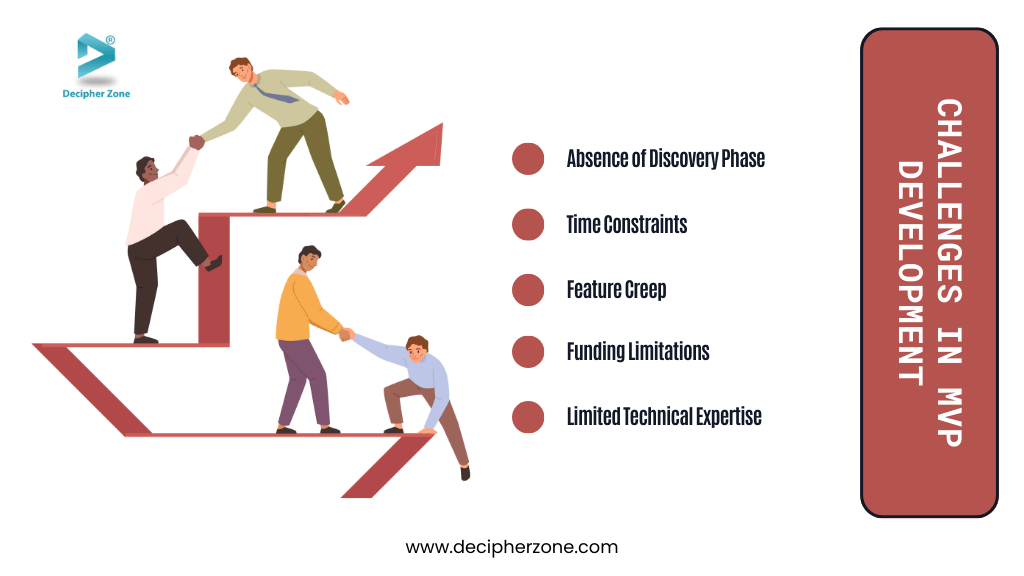
1. Absence of Discovery Phase
The discovery phase is the foundation layer of the project’s success. It sets the MVP’s monetization and scaling vectors. Skipping this step is like diving into the deep end without checking for water first. If you and your team don't take the time to nail down the project concept, set clear goals, and outline those all-important algorithms - you are walking straight into the minefield.
To overcome this, it is advised to look into all relevant factors before bringing an MVP development team on board. By doing so, you set the stage for a project that meets your needs and is prepared for growth and scalability.
2. Time Constraints
Startups often find themselves racing against tight deadlines, driven by the constant demands of stakeholders, investors, and the market's need for a swift launch. However, in the hustle to meet these timelines, they frequently overlook a crucial factor: speed can come at the expense of project quality. Rushing the development of an MVP often leads teams to cut corners, resulting in a product that is riddled with bugs, has incomplete features, and offers a subpar user experience. This inevitably causes early adopters to lose interest in the product almost immediately.
To prevent this situation, startups should maintain a balance between speed and quality. It's essential to pinpoint the key features and ensure they are delivered to users effectively and accurately.
3. Feature Creep
This is the most common trap startups fall into - feature creep. Usually, it starts with a simple list of essential features which later turns into the strong temptation of adding “just one more feature”. Suddenly an MVP which was supposed to be minimalistic with basic features becomes a product inflated with too many features, defying the purpose of MVP - to test the idea.
Avoid this trap by simply remembering the essence of MVP and adding just the necessary features required to validate the idea in the market. Everything else can be implemented after the MVP is successful and is ready to be transformed into a fully-fledged software solution.
4. Funding Limitations
Startups typically operate on a tight budget, so allocating funds wisely is a necessity in the early phase for them. Unfortunately, developing an MVP requires investment in technology, development team, UI/UX design, user testing, etc., making it difficult to find the balance between quality and affordability.
The simplest way to avoid getting struck by funding limitations is to engage in proper planning, create clear roadmaps, and allocate budgets effectively. The core focus of the startup should be on delivering the basic product while leaving space for further iterations.
5. Limited Technical Expertise
Not every startup has an in-house team of developers experienced in MVP development. Some founders may have brilliant ideas but lack the technical expertise to bring them to life. This knowledge gap can result in challenges such as selecting the appropriate development approach, creating a scalable infrastructure, and implementing adequate security measures.
The easiest solution to overcome this challenge is to partner with an MVP development company like Decipher Zone that can bridge this gap. They have the experience and expertise to navigate technical challenges, ensuring the development of scalable and robust MVPs.
Ever wondered how a dedicated MVP development company could significantly enhance your startup's journey? Let’s find out!
Defining an MVP Development Company
An MVP development company consists of a team of skilled professionals specialized in creating minimal viable products. These experts are well-versed in the challenges and benefits associated with MVP development. Their primary focus is on delivering a basic version of the product that highlights essential functionalities and features, aligns with market needs, and enhances user experience while preventing unnecessary feature expansion.
That being said, the MVP development company works as your strategic partner, helping you refine the vision, prioritize features, and build a product that gets the job done - without going overboard. These constraints can be the bridge between achievement and budget blowout.
How an MVP Development Company Ensures Market Fit?
Ensuring that the MVP meets the market needs is the most crucial task when it comes to its development. If the solutions don’t address any real needs of the users, no amount of additional features can make it successful. However, partnering with an MVP development company guides you through the process to ensure the product is fit for the market.
Some key strategies they use are:
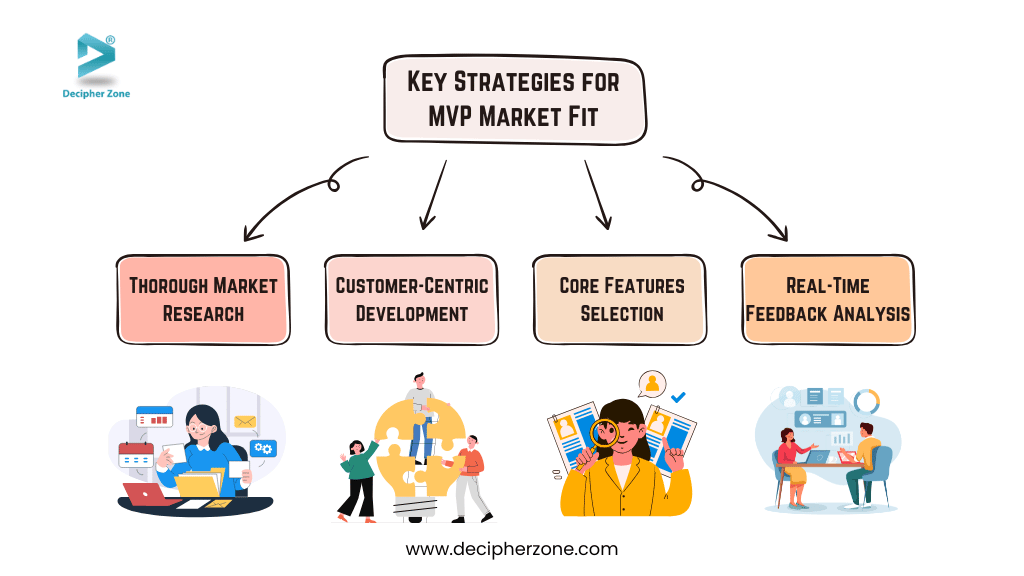
A. Thorough Market Research
Before development, an MVP development company does in-depth market research to learn the ongoing demands and needs of the landscape. This is done through competitor analysis, target demographics identification, and potential customer pain point detection. Through this research-driven approach, MVP is developed in a way to effortlessly aligns with the market demands, increasing its chances of early adoption and traction.
B. Customer-Centric Development
The focus of the MVP development company is on developing a product for the users to make sure it fits the market fit, solves a pain point, and is easy to use. Following this customer-centric approach, developers keep the needs of users at the forefront to create an MVP that resonates with the target audience.
C. Core Features Selection
More often than not, businesses fall under the trap of feature creep-in, but having an MVP development partner can help you avoid it by selecting the most essential features that can provide value to early users. Rather than trying to impress with a ton of features, an MVP development team zeroes in on the features that align with market demand, increasing the chances of its success.
D. Real-Time Feedback Analysis
An ideal MVP development company assists you in gathering real-time feedback post-launch to check whether it’s meeting the market expectations. They analyze the feedback to refine the product through quick iterations until it perfectly conforms with the user requirements.
Role of MVP Development Company in Business Growth
An MVP development company is crucial for helping startups start and achieve long-term business growth. Let’s explore the key roles this strategic partnership plays in supporting the business's ongoing success.
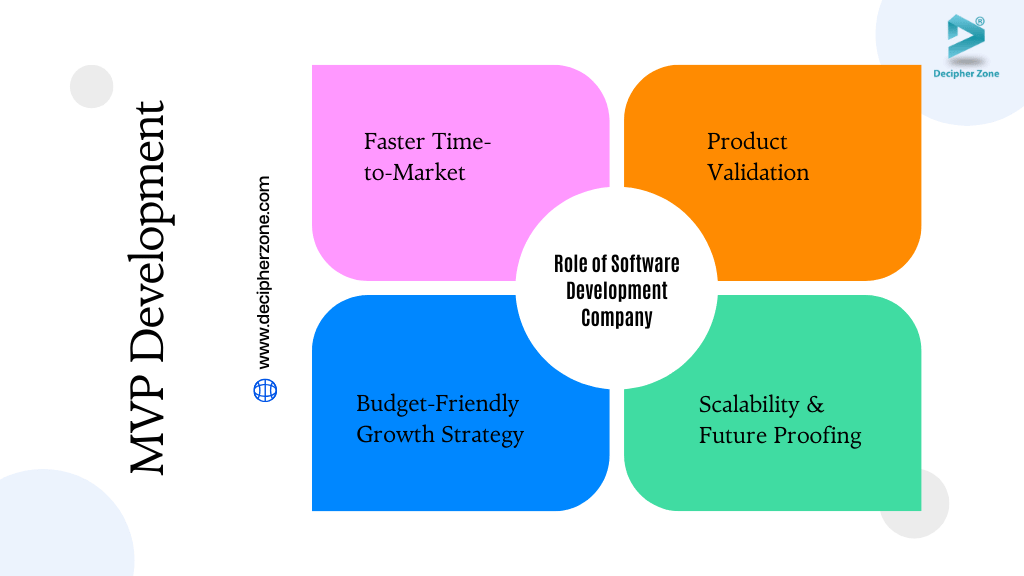
Faster Time-to-Market
In this fast-paced world of startups, delivering products swiftly can significantly boost the chances of success. By reducing the time it takes to move from concept to market, businesses can quickly validate their ideas and capitalize on opportunities before competitors can catch up.
Product Validation
Validation is required to determine the future of your MVP. With the assistance of the MVP development companion, businesses can build a product that’s prepared for real-world testing. This approach allows you to collect valuable data on customer preferences, satisfaction, and behavior, which can help refine the product. By learning from these insights, startups can discern what’s working and what isn’t, thus steering clear of costly missteps down the road.
Budget-Friendly Growth Strategy
Developing a fully-featured product from the start can quickly deplete both time and funds for a startup. However, partnering with an MVP development company can help reduce this risk by focusing on the essential features you need to enter the market without overspending. By allocating resources efficiently, you can invest more in marketing, scaling, and other initiatives that contribute to long-term business growth.
Scalability & Future Proofing
The MVP lays a solid foundation for a business's future growth. Consequently, an MVP development company ensures that the product is made with a flexible architecture, allowing for easy scalability, seamless integrations, and the addition of new features without the need to rebuild the project from scratch.
Top 4 Benefits of Partnering with an MVP Development Company
Are you still wondering whether or not to partner with an MVP development company? Here are the top reasons why partnering with one would be a smart move for your business.
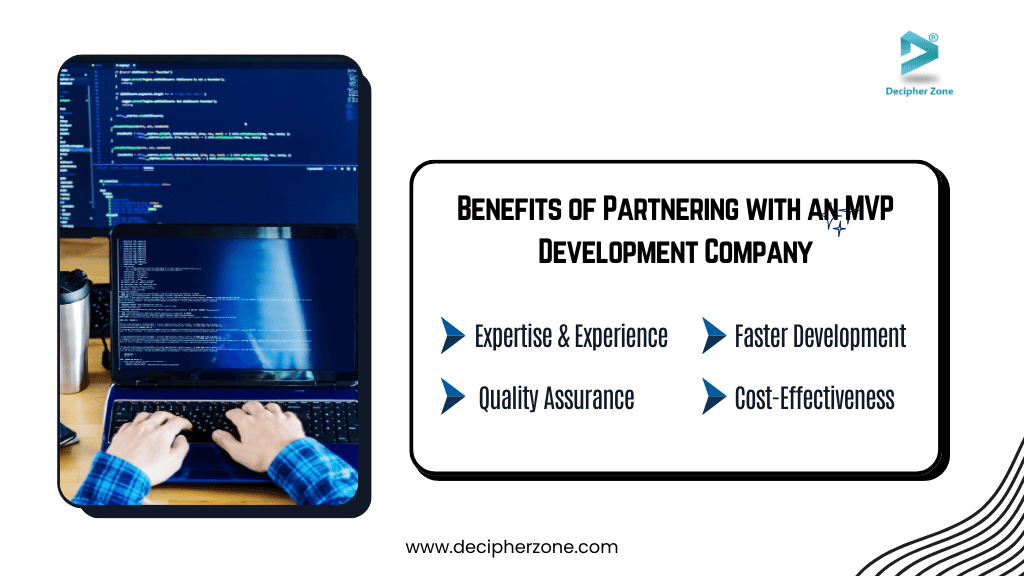
1. Expertise & Experience
Working with MVP software development company gives you access to the expertise and experience of seasoned developers. They know the key ingredients for MVP success, i.e., common challenges, best practices, and strategies. Their expertise makes it easier to avoid mistakes that could derail the project.
2. Faster Development
It is well known that speed is crucial for an efficient MVP project. MVP development partners specialize in delivering projects quickly while maintaining high quality. By using agile methodologies, they streamline the development process, concentrating on the essential elements needed to get the product into the hands of users. This approach enables teams to gather early feedback and adapt to the evolving market.
3. Quality Assurance
A reliable partner emphasizes on quality of the software to ensure that the product is built to meet the high standards of users and stakeholders. To do so, the MVP development company has a well-defined set of development processes that guarantees that the product is functional and free of bugs.
4. Cost-Effectiveness
Collaborating with a software development company can be a budget-friendly alternative for startups compared to bringing on an in-house development team. These firms provide flexible outsourcing options, allowing you to get the most out of your investment.
What to Look for When Choosing an MVP Development Company?
Opting for the right software development partner is as critical as air if you want the app to survive. Don’t worry! We’ve got you covered – here’s what to look for when choosing a partner that won’t let your startup sink.
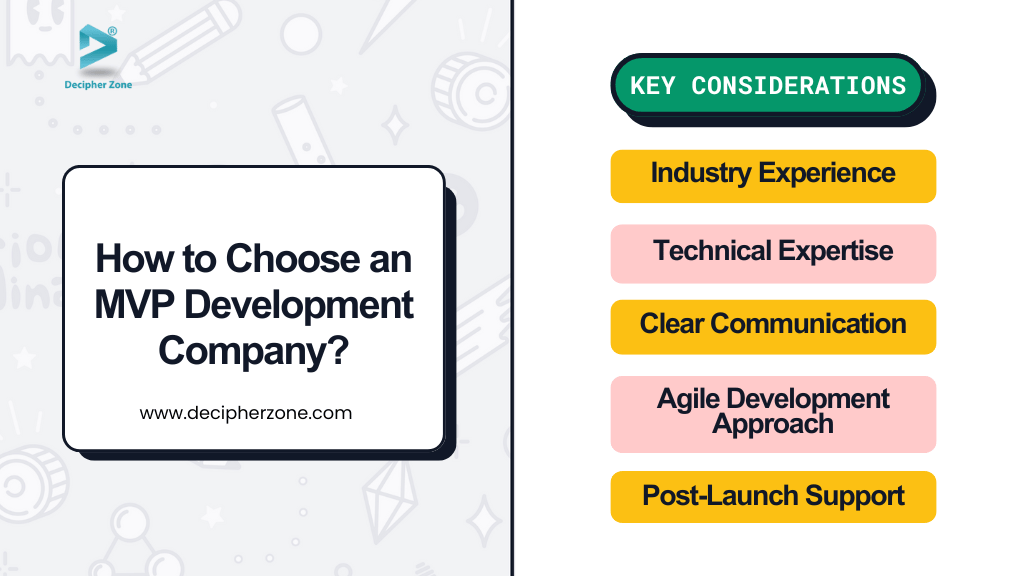
Industry Experience:
Begin by searching for a company that has experience in industries similar to yours. Having industry-specific expertise can greatly benefit your Minimum Viable Product (MVP), as these companies will have valuable insights into market trends, user demands, and the competitive landscape.
Technical Expertise:
Another aspect of the company that will decide the future of the MVP is the technical expertise of their team. To assess this, review the company's portfolio and case studies to confirm they have a proven track record of developing software or apps using technologies relevant to your MVP. These resources will provide valuable insights into their past projects.
Clear Communication:
Having good communication between you and the developers is non-negotiable. You need a company that’s transparent and keeps you in the loop throughout the MVP development process. Search for a partner that provides regular updates, clear timelines, and channels for discussions.
Agile Development Approach:
When developing an MVP, the requirement for continuous review and iteration is a must. Look for a company with an agile development approach as they will prioritize small, incremental releases to gather feedback, test features, and make necessary adjustments quickly. This will ensure that the development process remains smooth and adaptable.
Post-Launch Support:
Launching the MVP is just the beginning; it doesn't conclude all the necessary tasks. An ideal MVP development partner should provide post-launch support to address bugs and assist in scaling the product as your user base and requirements expand. This support will help you remain relevant and competitive in the market, allowing you to focus on growth rather than managing updates and post-launch issues alone.
MVP Development Process
Creating a Minimum Viable Product (MVP) involves a streamlined approach to product development. The MVP process is designed to quickly validate a product idea while using minimal resources. It allows for ample feedback, refinement, and iteration.
The typical MVP development process that teams usually follow includes the following steps:
-
Identifying and validating the product idea through market research.
-
Determining the essential features needed for the MVP.
-
Creating visual representations of the product to guide development in the form of wireframing and prototyping.
-
Selecting the appropriate technology tools and frameworks.
-
Building the MVP based on the defined features.
-
Ensuring the product functions correctly and meets quality standards.
-
Gathering feedback and suggestions from users.
-
Refining the product based on user feedback.
-
Releasing the MVP to the public and promoting it.
-
Tracking the product’s performance and making enhancements as needed.
This process allows teams to create effective products efficiently while remaining adaptable to user needs.
Cost to Develop an MVP
Developing a Minimal Viable Product (MVP) can cost anywhere from $12,000 to $55,000. This cost variation depends on the number of designers and developers involved, their experience, the complexity of the project, the number of features, UI/UX requirements, the tech stack used, and the location of the development team.
Key Takeaway
As a startup, if you are dreaming of developing the next big thing for the users without blowing your budget and time, collaborating with an MVP development company will be your golden ticket. These companies take your bold ideas, do the market research, and create a product that’s ready to hit the market within a few months.

At Decipher Zone Technologies, we specialize in MVP development, providing market research and agile development to ongoing support post-launch. Be it a web app, mobile app, or native software, we’ve got the expertise to make your MVP a hit.
Ready to turn the idea into reality? Get in touch with us today!
FAQs
1. What is MVP?
MVP (Minimal Viable Product) is like a rough draft of your idea, which is a basic version of the software solution that can be released on the market. It will enable you to collect feedback from the customer and understand their requirements, without going all-in development.
2. How long does it take to develop an MVP?
Depending on the industry, complexity, and type of MVP solution, it can take anywhere from one to four months to develop one.
3. Can an MVP be scaled into a full-fledged product?
The primary purpose of MVP software is to validate your idea. Once you receive positive feedback from your target audience, you can use the MVP as a foundation to integrate additional features and functionalities, ultimately transforming it into a complete software product.

